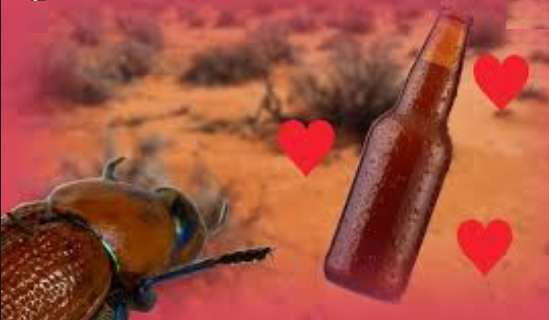Guest Blog by Gary Nelson

A common-sense view of our own cognition is that we see things as they actually are unless we are hallucinating – our cognition is veridical (the truth). Cognitive scientist Donald Hoffman says NO, our cognition is not veridical, it is optimized by evolution to maximize our chances of staying alive to reproduce.
Hoffman tells of an Australian beetle that nearly went extinct because its cognition was not veridical. During mating, males fly around looking for two-inch long bumpy amber females on the ground. A problem arose when Australian human males began tossing away bumpy amber beer bottles that were more attractive to male beetles than the smaller bumpy amber females. Size matters.
That is a cognitive bias – a cognitive response to some situation that was optimized by evolution to maximize fitness – not to describe “reality.” Cognitive biases are not necessarily pathological, but they can cause problems when the modern situation bears little resemblance to the situations from which they sprang so long ago.
Here is a link to 50 Cognitive Biases in the Modern World. You can peruse them and see what fits.
I think the Dunning-Kruger Effect is worth learning to appreciate – the less you know, the more confident you are. I find it is useful, when a burst of confidence floods in while dealing with a new topic, to assume there is more to the problem. So far, it’s always proved to be true.
Another bias is In-group Favoritism – we favor people who are in our in-group as opposed to an out-group. Tribalism is another name for this especially troublesome cognitive bias. The July issue of Scientific American provides an example. Between 5000 and 7000 years ago, farmers invaded and colonized what is now Europe, subjugating and perhaps obliterating the indigenous hunter-gatherers who had also migrated out of Africa by a different route at a different time. That they shared a common heritage was invisible. In their ignorance, “otherness” prevailed and the outcome was not pretty.
Today, tribalism not only still exists, it is exploited by political operatives using social media.
Becoming aware of these biases is necessary but not sufficient to outgrow their influence. Pay attention.

Tribalism. to me, in interesting because it can be reinforced so easily. i recently had a guy over to help me with some house repairs. we chatted and got on well. Then our conversation drifted to politics. a wall went up. I could not reach him.. His far-right logic (Trump logic) was impossible.
since then, i realize that this is two-sided. I probably took as far gone to him as he does to me. Both of us have reinforced tribalism.(the fact that I am right is not relevant here) to reach him on this, I must enter the topic carefully, avoiding triggers. a challenge but the next time I see him, I’m going to give it a try,
I’ve been aware that police have become “the other” for a lot of people who assume the worst about all police. What I find difficult to understand is why these good people don’t realize that they are now doing to police what has been done to African Americans for centuries. And the rhetoric has the risk of triggering some unstable people to decide to run over or shoot police who are eating lunch or sitting in their cars, etc. Some of the posts on social media are incredibly inflammatory and divisive. I occasionally point this out and it hasn’t been received well at all. Officers are leaving policing in droves all over the country and are very demoralized.
Easier to spot in others, and helped by conversation. It’s hard to get into a mental state where you can hear an opinion different than yours, but it’s generally worth the effort.
Your last 2 sentences speak volumes to me Gary. This election season makes your advice essential. In-group favoritism has divided us so sadly and badly. We are still all in this together, but we forget that when we aren’t paying attention.